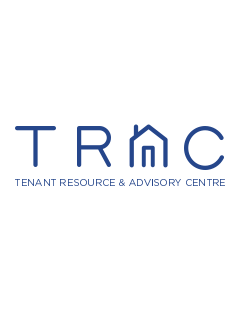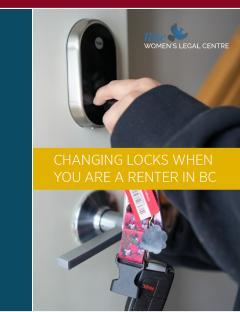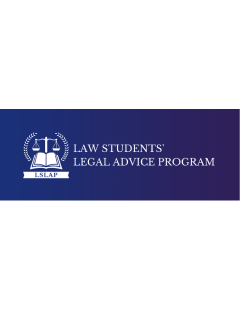Tenants & landlords
Last reviewed July 2025 by the Clicklaw editors
Renting can come with its share of challenges for both tenants and landlords. Whether you’re new to renting, a seasoned tenant, or considering renting out your property, knowing your rights and responsibilities can make all the difference.
Explore the links below to reliable online guides and tools and to organizations in BC. They have been chosen by librarians at Courthouse Libraries BC.
Selected resources
Click on a topic to see a list of resources.
|

Your Tenancy: Finding Rental Housing
Tenant Resource & Advisory Centre (TRAC)
Tips on finding a place to rent, including potential additional costs, what questions to ask when you view a unit, the signs of a rental scam, what to do if you have a poor credit history, and information on tenant insurance. Includes templates for a cover letter, references list, and pet resumé.
Last reviewed July 2025

Your Tenancy: Deposits
Tenant Resource & Advisory Centre (TRAC)
A security deposit is money that your landlord collects at the start of the tenancy and holds on to until you move out. Find out more details about it, including pet damage deposits, overpaying deposits, applying deposits toward rent, and getting your deposits returned.
Last reviewed July 2025

Your Tenancy: Roommates
Tenant Resource & Advisory Centre (TRAC)
Discusses different types of roommate arrangements: co-tenants, tenants in common, and occupants/roommates. The page emphasizes the importance of having a roommate agreement to prevent disputes and outlines the legal avenues for resolving conflicts. It also includes a template for a roommate agreement.
Last reviewed July 2025

Starting a Tenancy
Tenant Resource & Advisory Centre (TRAC)
Everything you need to know in order to start a tenancy. Includes finding housing, deposits, agreements, pets and insurance.
Last reviewed September 2025

Your Tenancy: Repairs and Maintenance
Tenant Resource & Advisory Centre (TRAC)
This resource includes a list of repair and maintenance issues that landlords are generally responsible for, what to do when you need an emergency repair, and what is considered reasonable wear and tear versus damage that the tenant must fix.
Last reviewed July 2025

Rent Increases
Residential Tenancy Branch (Government of BC)
This page explains the law around rent increases. Topics covered include when rent can be increased, the current annual increase percentage, and how to dispute unlawful rent increases.
Last reviewed July 2025

Your Tenancy: Quiet Enjoyment
Tenant Resource & Advisory Centre (TRAC)
As a tenant, you have the right to reasonable privacy, and freedom from unreasonable disturbances from both neighbours and landlords. Learn about the rules for when the landlord can enter your unit, and what you can do about excessive noise and other breaches of quiet enjoyment.
Last reviewed July 2025

Changing Locks When You Are a Renter in BC
Rise Women’s Legal Centre
After separating from a partner, you may want to know if you can change the locks to your rental home. Different living situations can create different legal rights and responsibilities. This guide will help you figure out if you can change the locks and how to get it done.
Last reviewed July 2025

Your Tenancy: Evictions
Tenant Resource & Advisory Centre (TRAC)
An eviction occurs when a landlord legally forces a tenant to move out of a rental unit. This resource looks at the different kinds of evictions, including the different lengths of notice periods, and the deadlines to dispute eviction notices.
Last reviewed July 2025

Types of Evictions
Residential Tenancy Branch (Government of BC)
There are various kinds of evictions, such as for unpaid rent or for a major renovation. Find out how much notice a landlord needs to give to end a tenancy, and how much time a tenant has to dispute the eviction and apply for dispute resolution.
Last reviewed July 2025

Your Tenancy: Moving Out
Tenant Resource & Advisory Centre (TRAC)
Discusses your responsibilities when moving out. This resource gives tips on giving notice, your cleaning responsibilities, inspection reports, and getting your damage deposit back.
Last reviewed July 2025

End a Tenancy
Residential Tenancy Branch (Government of BC)
This resource explains that landlords and tenants must end tenancies lawfully. Learn about landlord and tenant rights and responsibilities when ending a tenancy. Other topics include options for tenants to end a tenancy, evictions, mutual agreement to end a tenancy, special circumstances to end a tenancy, breaking a lease, and more.
Last reviewed July 2025

Your Tenancy: Template Letters
Tenant Resource & Advisory Centre (TRAC)
If you’re experiencing a problem in your tenancy, you should consider putting your concerns in writing to your landlord. TRAC offers the following template letters: Request for Repairs, Request for Return of Deposit, Response to Illegal Eviction Notice, Loss of Quiet Enjoyment, Bed Bugs, and more.
Last reviewed July 2025

Your Tenancy: Roommate Agreement Template
Tenant Resource & Advisory Centre (TRAC)
An agreement template to get you and your roommate or roommates to think about what rules you want to agree to before living together. It can be used when some or all of the roommates will be on the tenancy agreement, or when you’re already living in a rental unit and a roommate will be moving in.
Last reviewed July 2025

Tenancy Calculators
Residential Tenancy Branch (Government of BC)
Use the calculators here to find deadlines or calculations for residential tenancies in BC. Topics include: interest on security deposits, the last date a landlord must return the tenant’s security or pet damage deposit(s), when a landlord can increase rent and the max allowable, and when a landlord can apply to the RTB for an order of possession.
Last reviewed July 2025

Toolkit for Landlords and Tenants
Residential Tenancy Branch (Government of BC)
Template letters to assist landlord and tenant communication. Includes templates for: witness statement, warning letter, request for repairs, and incident reports.
Last reviewed July 2025

Tenancy Laws and Rules
Government of British Columbia
This page shows the laws and rules you need to follow during a tenancy. It also provides links to the rules and expectations for a tenancy hearing, and to help with residential tenancy issues. The sub-page 'Types of rental housing situations' describes the housing situations covered by the tenancy laws, and what to do if your tenancy is not covered...
Last reviewed July 2025

Your Tenancy: Alternatives to Dispute Resolution
Tenant Resource & Advisory Centre (TRAC)
The Residential Tenancy Branch handles most rental disputes in BC, but there are some exceptions where you’d have to go to court or a tribunal. This resource discusses other options including negotiating a settlement or using an arbitrator.
Last reviewed July 2025

Tenancy Dispute Resolution
Residential Tenancy Branch (Government of BC)
Dispute resolution is the formal process to resolve conflicts between landlords and tenants. It should be the last step in dealing with a tenancy conflict if you're unable to work out a tenancy issue. This page provides information about the dispute resolution process and includes a link to the online application.
Last reviewed July 2025

Tenancy Forms
Residential Tenancy Branch (Government of BC)
Provides links to essential tenancy forms grouped by topic: starting a tenancy, rent increases, dispute resolution, dispute resolution decisions and orders, ending a tenancy, and condition inspection. Forms listed alphabetically and by number are also available.
Last reviewed July 2025

Past Tenancy Dispute Resolution Decisions
Residential Tenancy Branch (Government of BC)
Find out if the RTB has already heard and made a decision on a similar issue by searching past decisions online. Reviewing past decisions will give you insight into what’s likely to happen if you submit an application for dispute resolution.
Last reviewed July 2025

Your Tenancy
Tenant Resource & Advisory Centre (TRAC)
Legal information for all stages of your tenancy — from starting a tenancy to ending one. This resource includes how to resolve disputes.
Last reviewed July 2025

During a Tenancy
Residential Tenancy Branch (Government of BC)
Information for landlords and tenants about their rights and responsibilities during a tenancy. Covers topics such as rent increases, repairs, landlord’s access to rental properties, possession of the rental unit, quiet enjoyment, changes to the tenancy agreement, serving notices, etc. Includes forms.
Last reviewed July 2025

LSLAP Manual: Landlord and Tenant Law
Law Students’ Legal Advice Program (LSLAP)
This chapter is from the manual used by law students handling cases at LSLAP’s legal clinics. It provides a summary of the law relating to tenancy agreements, security deposits, rent increases, tenants’ and landlords’ rights, termination, and eviction. Dispute resolution are also addressed.
Last reviewed November 2025

Tenancy Information Sheets, Toolkits and Resources
Residential Tenancy Branch (Government of BC)
This page includes important summaries of helpful tenancy information for both tenants and landlords. Includes some letter-writing templates and multi-lingual resources.
Last reviewed July 2025